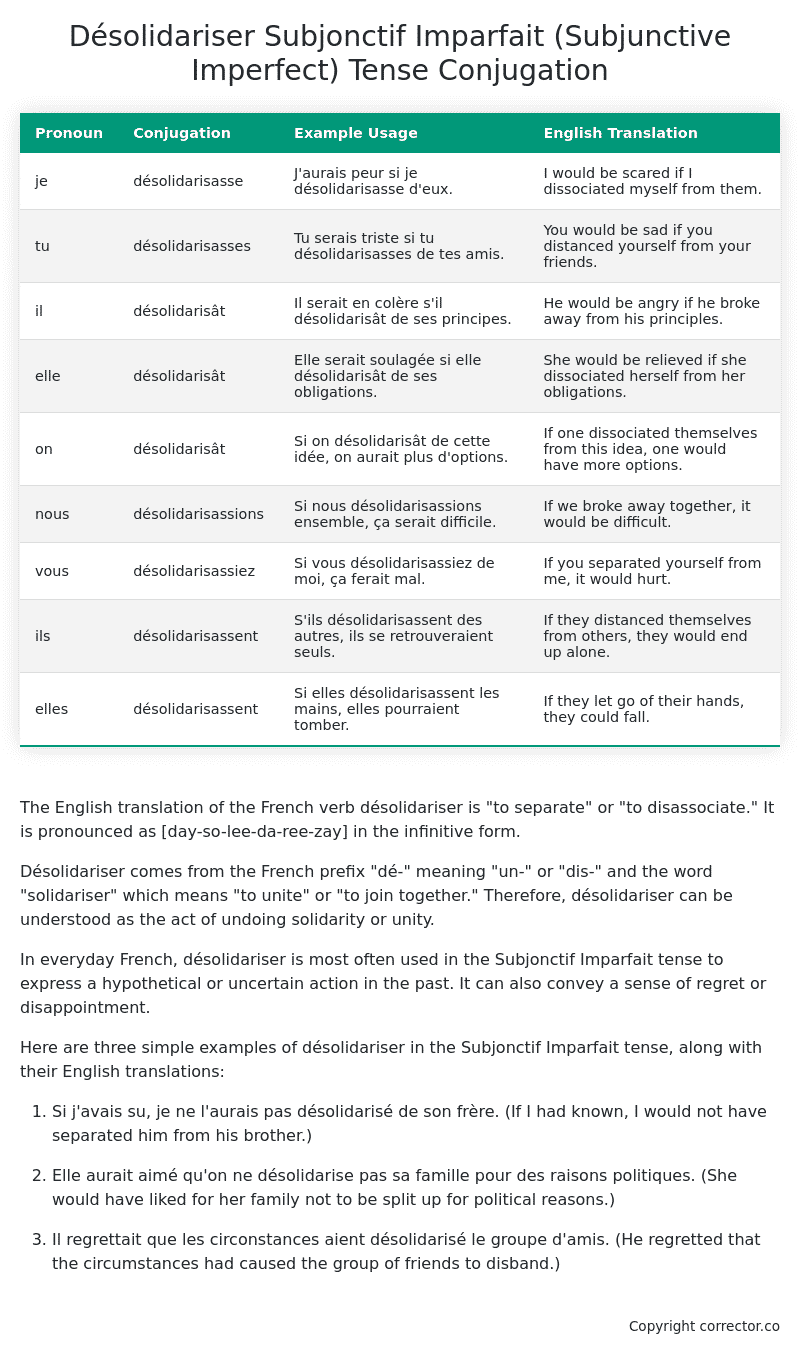Subjonctif Imparfait (Subjunctive Imperfect) Tense Conjugation of the French Verb désolidariser
Introduction to the verb désolidariser
The English translation of the French verb désolidariser is “to separate” or “to disassociate.” It is pronounced as [day-so-lee-da-ree-zay] in the infinitive form.
Désolidariser comes from the French prefix “dé-” meaning “un-” or “dis-” and the word “solidariser” which means “to unite” or “to join together.” Therefore, désolidariser can be understood as the act of undoing solidarity or unity.
In everyday French, désolidariser is most often used in the Subjonctif Imparfait tense to express a hypothetical or uncertain action in the past. It can also convey a sense of regret or disappointment.
Here are three simple examples of désolidariser in the Subjonctif Imparfait tense, along with their English translations:
-
Si j’avais su, je ne l’aurais pas désolidarisé de son frère. (If I had known, I would not have separated him from his brother.)
-
Elle aurait aimé qu’on ne désolidarise pas sa famille pour des raisons politiques. (She would have liked for her family not to be split up for political reasons.)
-
Il regrettait que les circonstances aient désolidarisé le groupe d’amis. (He regretted that the circumstances had caused the group of friends to disband.)
Table of the Subjonctif Imparfait (Subjunctive Imperfect) Tense Conjugation of désolidariser
| Pronoun | Conjugation | Example Usage | English Translation |
|---|---|---|---|
| je | désolidarisasse | J’aurais peur si je désolidarisasse d’eux. | I would be scared if I dissociated myself from them. |
| tu | désolidarisasses | Tu serais triste si tu désolidarisasses de tes amis. | You would be sad if you distanced yourself from your friends. |
| il | désolidarisât | Il serait en colère s’il désolidarisât de ses principes. | He would be angry if he broke away from his principles. |
| elle | désolidarisât | Elle serait soulagée si elle désolidarisât de ses obligations. | She would be relieved if she dissociated herself from her obligations. |
| on | désolidarisât | Si on désolidarisât de cette idée, on aurait plus d’options. | If one dissociated themselves from this idea, one would have more options. |
| nous | désolidarisassions | Si nous désolidarisassions ensemble, ça serait difficile. | If we broke away together, it would be difficult. |
| vous | désolidarisassiez | Si vous désolidarisassiez de moi, ça ferait mal. | If you separated yourself from me, it would hurt. |
| ils | désolidarisassent | S’ils désolidarisassent des autres, ils se retrouveraient seuls. | If they distanced themselves from others, they would end up alone. |
| elles | désolidarisassent | Si elles désolidarisassent les mains, elles pourraient tomber. | If they let go of their hands, they could fall. |
Other Conjugations for Désolidariser.
Le Present (Present Tense) Conjugation of the French Verb désolidariser
Imparfait (Imperfect) Tense Conjugation of the French Verb désolidariser
Passé Simple (Simple Past) Tense Conjugation of the French Verb désolidariser
Passé Composé (Present Perfect) Tense Conjugation of the French Verb désolidariser
Futur Simple (Simple Future) Tense Conjugation of the French Verb désolidariser
Futur Proche (Near Future) Tense Conjugation of the French Verb désolidariser
Plus-que-parfait (Pluperfect) Tense Conjugation of the French Verb désolidariser
Passé Antérieur (Past Anterior) Tense Conjugation of the French Verb désolidariser
Futur Antérieur (Future Anterior) Tense Conjugation of the French Verb désolidariser
Subjonctif Présent (Subjunctive Present) Tense Conjugation of the French Verb désolidariser
Subjonctif Passé (Subjunctive Past) Tense Conjugation of the French Verb désolidariser
Subjonctif Imparfait (Subjunctive Imperfect) Tense Conjugation of the French Verb désolidariser (this article)
Conditionnel Présent (Conditional Present) Tense Conjugation of the French Verb désolidariser
Conditionnel Passé (Conditional Past) Tense Conjugation of the French Verb désolidariser
L’impératif Présent (Imperative Present) Tense Conjugation of the French Verb désolidariser
L’infinitif Présent (Infinitive Present) Tense Conjugation of the French Verb désolidariser
Struggling with French verbs or the language in general? Why not use our free French Grammar Checker – no registration required!
Get a FREE Download Study Sheet of this Conjugation 🔥
Simply right click the image below, click “save image” and get your free reference for the désolidariser Subjonctif Imparfait tense conjugation!

Désolidariser – About the French Subjonctif Imparfait (Subjunctive Imperfect) Tense
Formation
Common Everyday Usage Patterns
Interactions with Other Tenses
Subjonctif Présent
Indicatif Passé Composé
Conditional
Conditional Perfect
Summary
I hope you enjoyed this article on the verb désolidariser. Still in a learning mood? Check out another TOTALLY random French verb conjugation!


